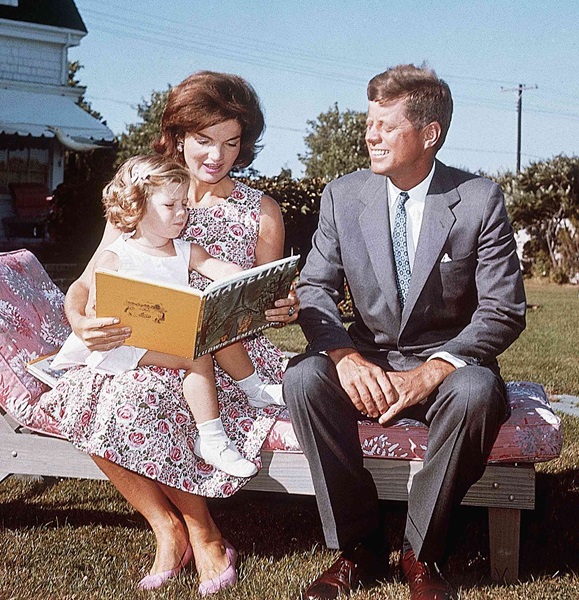|
|
|
|
In November 1960, John F Kennedy was elected President. He was young (44) with a family, and charismatic. His inaugural address challenged every American: “Ask not what your country can do for you – ask what you can do for your country". With an eye for the modern and the dramatic, he labelled his domestic policy: the 'New Frontier': Source A"We stand today on the edge of a new frontier, the frontier of unknown opportunities and perils.... Beyond that frontier are uncharted areas of science and space, unsolved problems of peace and war, unconquered problems of ignorance and prejudice, unanswered questions of poverty and surplus.... A whole world waits to see what we shall do. And we cannot fail that trust, and we cannot fail to try." President Kennedy, Speech to the Democratic Convention, 15 July 1960.
|
Going DeeperThe following links will help you widen your knowledge: Basic account from BBC Bitesize Opposition to the New Frontier
YouTube JFK's Presidency - traditional account
|
The 'New Frontier' Programme [ESCAPE]
|
Source B
JFK, Jackie and daughter Caroline, 1960.
NEW FRONTIER BILLS 'KILLED IN COMMITTEE' Before it can become a law, proposed legislation has to be scrutinised by Committees, which delete or change the wording ... sometimes so much that the original Bill disappears completely.
Legislation 'killed in Committee' included:
Legislation passed, but significantly amended included:
|
Interpretations
Kennedy’s assassination on 22 November 1963 led to a paean of praise. Journalist Theodore White, commenting on the young President, his elegant wife and young family, quoted Kennedy’s favourite musical: ”for one brief shining moment, there was Camelot” (a reference to the legend of King Arthur). The histories of the next few years belonged to what are called the ‘Camelot School’ – e.g. Kennedy’s special assistant Arthur Schlesinger, whose A Thousand Days (1965) highlighted the 'New Frontier' and portrayed him as a glamorous and progressive leader. Later revisionist historians were less accepting. Professor of Political Science Bruce Miroff (1976) accused Kennedy of failing to grasp the opportunity that was presented to him, and thought that his reforms and policies could have achieved much more. Biographer Herbert Parmet (1983) concluded that he was “an ‘interim’ President who had promised but not performed”. Historian Thomas Reeves was even more hostile (1991). Reeves’s Kennedy was a flawed personality, a womaniser, arrogant, devious, ruthless and hypocritical. He was also very poorly – with Addison’s disease, irritable bowel syndrome and back pain – for which, throughout the crises of 1961, he was taking large doses of amphetamines. Reeves considered Kennedy inept in domestic politics, unable to control the Southern Democrats (although he was a Democrat), which was why so many of his Bills failed in Congress. Recent historians have been kinder. Robert Dallek (2003) concluded: “Kennedy’s thousand days inspired visions of a less divisive nation and world, and demonstrated that America was still the best hope of mankind”. And Thurston Clarke, focussing on Kennedy’s Last 100 Days (2013) believed that Kennedy had grown into a great President – that his poverty programme, civil rights legislation and Medicare plans laid the basis for the achievements of President Johnson’s ‘Great Society’.
Source CKennedy left America better than he found it and he had grown in office during his final year. Even though he failed to accomplish most of his major domestic legislative agenda, he did promote economic growth, kept unemployment and inflation low, laid the foundations for major tax cuts, improved conditions on the agricultural front, implemented the first public housing program since 1949, reduced discrimination against women, and made his belated commitment to civil rights a moral issue that led to the passage of the Civil Rights Act of 1964 under President Johnson. He also updated traditional New Deal commitments such as social security and the minimum wage. American historian James Giglio, Writing Kennedy (2014).
|
Did You KnowInterviewed in The Historian in 2023, Professor Anthony Badger argued that "while legal discriminaton may have been tackled, the societal attitudes around race were not addressed", and that - as for Kennedy - that is why the Democrats are still failing in the South.
Consider:1. Consider Source B. It is propaganda. What image of President Kennedy was it trying to convey? 2. Go through this webpage and pull out everything you could use to 'trash' the reputation of Kennedy and the 'New Frontier' programe. 3. Consider the policies, and the historians' interpretations of those policies. What IMPACT did the 'New Frontier' programme have on the lives of American citizens? 4. Write an 'on-the-one-hand-on-the-other' essay: "'More style than substance.' How fair an assessment is this of Kennedy's New Frontier programme?"
|
|
| |
